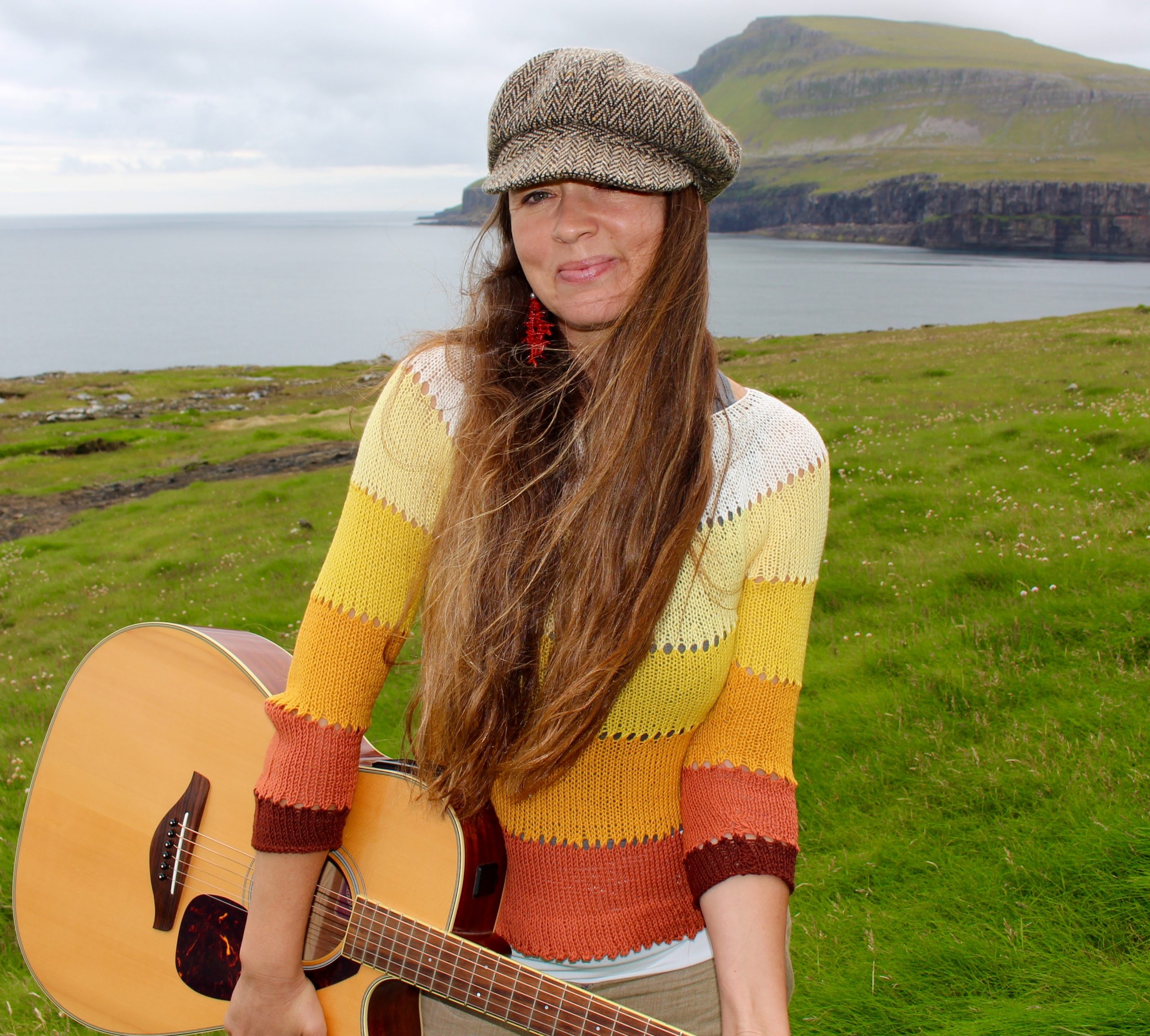Kristina M. Jacobsen
Associate Professor of Ethnomusicology

Kristina M. Jacobsen
Associate Professor of Ethnomusicology
Ph.D., Duke University
kmj23@unm.edu
(505)277-1829
Hokona/Zuni Hall Room 307
www.kristina-jacobsen.com
Curriculum Vitae
photo by Evy Toftegaard-Nielsen. Nólsoy, Faroe Islands
Kristina Jacobsen holds a PhD in Cultural Anthropology from Duke University, the MPhil in Ethnomusicology from Columbia University, a Master’s in Ethnomusicology from Arizona State University, and a Bachelor’s degree in Music (flute performance) and History (concentration: Native North America).
Dr. Jacobsen is an ethnographer, singer-songwriter and cultural anthropologist. An Associate professor of Ethnomusicology and Anthropology (Ethnology), she is the coordinator for the newly founded Songwriting Focus Area within the Bachelor of Arts in Interdisciplinary Arts degree within the College of Fine Arts and the founder and co-facilitator of the UNM Honky-Tonk Ensemble.
Jacobsen’s research focuses on language reclamation, expressive culture, popular music, and arts-based research methodologies. Her first book, The Sound of Navajo Country: Music, Language and Diné Belonging (UNC Press, 2017), is based on 2 ½ years of singing and playing steel guitar with Navajo (Diné) country western bands on the Navajo Nation and was the winner of the Woody Guthrie Award (2018 IASPM-US) for most outstanding book on popular music. Her research interests merge the fields of cultural anthropology, linguistic anthropology and ethnomusicology, with specializations in music and language, anthropology of the voice, politics of authenticity, Indigeneity and belonging, vernacular music of Native North America, Sardinia and the Appalachian mountains, race and musical genre, language reclamation, and working class expressive cultures. Her most recent co-edited project, The Creative Ethnographer’s Notebook (co-edited with Melisa Cahnmann-Taylor) is a craftbook offering hands-on exercises engaging ethnography and the arts for undergraduate anthropology and arts-based classrooms (Routledge 2024).
Jacobsen recently completed one year of ethnographic fieldwork on the Mediterranean island of Sardinia as a US-Italy Fulbright Scholar (“con il Sud”), where she studied the Sardinian language, writing songs with interlocutors in the field, and expanding upon a research methodology she calls “ethnographic songwriting” for her latest book project, a musical ethnography titled Sing Me Back Home: Ethnographic Songwriting and Language Reclamation in Sardinia, Italy (under review); while in Sardinia, she also recorded an album (her fourth) of original songs collaboratively written with Sardinian songwriters and language activists, House on Swallow Street, with the Italian label Talk About Records (2021).
Recent research articles include “‘Don’t Even Talk to Me if You’re Kinya’áanii
[Towering House]’: Adopted Clans, Kinship, and ‘Blood’ in Navajo Country” (co-authored with Shirley Ann Bowman, NAIS 6(1), 2019), which was awarded “Most Thought-Provoking Article of 2019” by the Native American and Indigenous Studies Association (NAISA). Other recent publications include “The Right to Lead”: Navajo Language, Dis-citizenship, and Diné Presidential Politics,” co-authored with Kerry F. Thompson (Journal of Sociolinguistics, 24 (1), 2020), “New Skies Above: Sense-bound and Placebased Songwriting as a Trauma Response for Asylum Seekers and Refugees” (with Klisala Harrison & Naomi Sunderland, Journal of Applied Arts & Health 10 (2), 2019) and “Someone Else’s ‘Country’: American Roots Music and Rural Identity in Sardinia, Italy” (Journal for the Anthropology of North America, 22 (2) 2019). Her widely cited chapter on ethnography and songwriting, “Songwriting as Ethnographic Practice, or How Stories Humanize,” appeared in the book, Arts-Based Research in Education: Foundations for Practice, edited by Melisa Cahnmann-Taylor and Richard Siegesmund (2017; 2nd edition).
Jacobsen’s work also has a strong applied and public-facing component. Most recently, this is seen in the culturally-immersive, week-long songwriting intensives she offers in her two primary field sites: on the Navajo Nation, on the Camino de Santiago in northern Spain, and on the Italian island of Sardinia (“Songs from the Rez,” Songs of Santiago, and “Songs of Sardegna,” respectively). Workshops are tuition-free to citizens of Navajo Nation and Sardinia, and focus on the co-writing of songs to develop deeper intercultural understanding and awareness of social differences across lines of race, class, nation, social class, gender and ability. Jacobsen has taught songwriting workshops in the Swedish and Italian prison systems and to political asylum seekers and refugees in Finland with the Finnish Red Cross.
Jacobsen fronts and writes for the all-female honky-tonk band, Merlettes. A touring singer-songwriter and country artist, she has completed songwriting tours in Sardinia, Denmark, Sweden, South Africa, the Republic of Cyprus, and the Faroe Islands, Italy, and has been nominated for three New Mexico Music awards. She performs for house concerts, listening rooms, social justice events, and in beautiful and unique locations (mountaintops, caves, beaches, islands) around the world.
Prior to coming to UNM, Jacobsen taught courses in linguistic anthropology, Native American Studies, ethnomusicology and cultural anthropology at Duke University, Diné College (Chinle and Crownpoint campuses) and Northern Arizona University. To learn more about her research, teaching and music, visit:
To access publications, please visit: https://unm.academia.edu/KristinaJacobsen
Courses Taught:
Creative Ethnography
Anthropology of Music and Sound
Country Music and Cultural Politics
UNM Honky Tonk Ensemble (ongoing)
Diné (Navajo) Expressive Culture
Global Indigenous Media
Proseminar in Anthropology of Music
Songwriting I, II and III (ongoing; part of “Songwriting in Community” program)
Music in Culture
Music of the Baroque
Classic and Romantic Music: An Ethnographic Approach to Historical Performance Practice
Introduction to Cultural Anthropology
Introduction to Linguistic Anthropology
Anthropology of Native North America
Culture and Politics in Native America
